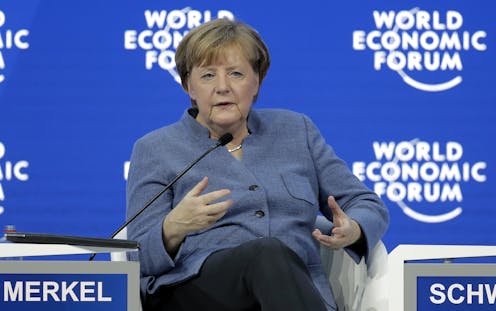Violent past, digital future: Angela Merkel's remarks at Davos
Will young Germans remember their history – and will older German embrace the digital future?

Two world wars and a genocide have a way of focusing the mind.
Maybe that’s why references to “lessons of the past” are almost ritualistic in addresses such as German Chancellor Angela Merkel’s to the World Economic Forum. Here’s how Merkel checked that box in Davos:
“100 years after the end of the First World War, and with eyewitnesses to the Second World War dying off, we must ask: have we really learned from this history, or haven’t we?”
In the era of Brexit, though, such statements are not just ritual. They are also a reminder that the European Union was created not to tweak trade measures or to massage monetary policies, but to make Europeans stop killing each other. As Merkel noted, the generations born after World War II will determine whether those lessons stick. Her implicit message was that the jury is still out.
Yet in Merkel’s remarks, the generational divide appeared most consequential not in attitudes toward the European Union or immigration, but rather in another context: digitalization.
The postwar generations
Merkel was born in 1954: a true representative of the postwar generation. Yet she appeared at Davos, as she does in so many international settings, as the staid senior counterpoint to France’s flashier President Emmanuel Macron, who was born in 1970. To express concern about “postwar generations” is not necessarily to hand elders the moral upper hand: Today’s seniors as well as young people are products of postwar Europe.
The economic challenges of an aging society are familiar in Europe. Fewer working people paying into the system, more retirees drawing from it. Yet Merkel also lamented another pitfall of an aging population – a lack of appetite for innovation, particularly in regard to digital technologies. Germany, Merkel bluntly said, is far behind the digital curve. Yet delaying digitization because seniors are comfortable without it is a disservice to younger generations.
Nevertheless, Merkel held, Europe has a critical role to play in shaping the digital future by navigating the issue of ownership of data. As she put it: In the United States, private firms have nearly uninhibited ownership of data; in China, the bodies collecting data and the state function almost as a single unit. Europe’s social market economy offers a middle way: a more just digital order built on a balance between private ownership and state control of data.
The “social market economy” does not just evoke Europe’s more generous welfare and labor policies. It is also a historical reference: a nod to the architects of postwar West Germany, who sought a middle way between free market capitalism and a state-planned economy. In the 1950s, memories of capitalism’s failure in the Great Depression, and its catastrophic political consequences, were close at hand. The equally frightening counterpart was the repressive, state-command economy of the USSR and its satellites. Now, Merkel seemed to say, the social market economy not only remains necessary: It should be a model for solving a distinctly 21st-century problem.
Germany’s concern for privacy is also a legacy of the past. During the Great Depression, social workers’ collection of information to assist with clients’ medical and mental health needs seemed like a good idea – until the Nazis got their hands on all those records. For decades after the war, West Germany took painstaking measures to protect citizens’ privacy. The state-run telephone company, for example, did not keep records of numbers dialed by customers lest someone, someday be tempted to use those records to track a private citizen’s telephoning habits.
That was all well and good as long as the state had a monopoly on telephone lines.
If older Germans show little appetite for full-bore digitalization, younger Germans are as quick to post selfies in an age of facial recognition technology as their U.S. counterparts. Germany maintains stricter privacy laws than many other states, but German industry complains that such laws hinder innovation. As Merkel put it, “The Europeans haven’t decided how we want to handle data, and there’s a great danger that we may be too slow, that the world may steamroll us as we conduct philosophical debates about the sovereignty of data.”
Merkel’s metaphoric eye-roll at “philosophical debate” evoked a popular stereotype of Europeans - but one with queasy associations. The Weimar-era Nazis and Communists mocked parliamentary democracy as an impotent debating society. They, by contrast, were parties of action.
Merkel is not criticizing parliamentary democracy. She’s trying to save it from a re-emergent radical right. But in an era when firms like Google are more powerful than most states on the planet, liberal democracy faces a threat that is at least as potent as xenophobic political parties: preservation of the rights of the individual if individuals’ data is the property of private corporations or the state.
Merkel’s – and Europe’s – quandry is this: how to move forward in the digital age when Europe’s contribution is to seek balance between state power, individual rights and the dynamism of capitalism. Achieving that balance – achieving any balance – means slowing things down. It means philosophizing.
And so the question at hand may not be: Will postwar generations remember the lessons of the 20th century? Rather, the real question may be: Is this history an adequate guide to our present-day circumstances? And if it isn’t, can Germany, Europe or some other actor find an alternative in time to save us from the privacy-wrecking options already in play?
Elizabeth Heineman does not work for, consult, own shares in or receive funding from any company or organization that would benefit from this article, and has disclosed no relevant affiliations beyond their academic appointment.
Read These Next
Cuba’s speedboat shootout recalls long history of exile groups engaged in covert ops aimed at regime
From the 1960s onward, dissident Cubans in exile have sought to undermine the government in Havana −…
Drug company ads are easy to blame for misleading patients and raising costs, but research shows the
Officials and policymakers say direct-to-consumer drug advertising encourages patients to seek treatments…
Nanoparticles and artificial intelligence can help researchers detect pollutants in water, soil and
Tiny particles bounce light around in a unique way, a property that researchers are using to detect…




